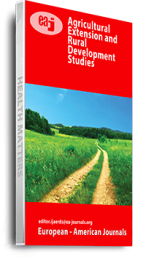This study assessed farmers’ preference for agricultural extension systems in Nigeria. The specific objectives included the description of socio-economic characteristics of farmers in the six geopolitical zones of Nigeria, determination of the number of farmers benefiting from public or private extension systems, farmers preference of extension delivery systems, etc. Data were obtained from primary and secondary sources. A random sampling technique was used in the selection of farmers. Descriptive statistics, likert scale were employed for analysis. The major findings of the study shows that, majority of the farmers were males and easily accessed agricultural extension services also, majority of the farmers have high preference for private extension system as is more relevance in addressing their problems. It is recommended that gradual steps be adopted in changing to private agricultural extension system and outsourcing of extension is require.
Keywords: Agricultural Extension, Private, public

